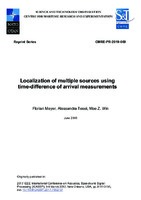| dc.contributor.author | Meyer, Florian | |
| dc.contributor.author | Tesei, Alessandra | |
| dc.contributor.author | Zwin, Moe Z. | |
| dc.date.accessioned | 2019-06-19T10:28:36Z | |
| dc.date.available | 2019-06-19T10:28:36Z | |
| dc.date.issued | 2019/06 | |
| dc.identifier.govdoc | CMRE-PR-2019-069 | en_US |
| dc.identifier.uri | http://hdl.handle.net/20.500.12489/809 | |
| dc.description.abstract | This paper addresses the problem of localizing an unknown number of static sources emitting unknown signals from time-difference of arrival (TDOA) measurements. Based on the framework of random finite sets and finite set statistics, we formulate the Bayesian estimation problem and develop a particle-based localization algorithm that overcomes the challenges related to the highly non-linear TDOA measurement model, the data associations uncertainty, and the uncertainty in the number of sources to be localized. Simulation results confirm that the number of sources can be determined correctly and accurate location estimates can be obtained when the number of false alarms is low and the probability of detection is high. | en_US |
| dc.format | 5 p. : ill. ; digital, PDF file | en_US |
| dc.language.iso | en | en_US |
| dc.publisher | CMRE | en_US |
| dc.source | In: 2017 IEEE International Conference on Acoustics, Speech and Signal, Processing (ICASSP), 5-9 March 2017, New Orleans, USA, pp.3151-3155, doi: 10.1109/ICASSP.2017.7952737 | en_US |
| dc.subject | Target localization | en_US |
| dc.subject | Finite differences | en_US |
| dc.subject | Monte Carlo method | en_US |
| dc.subject | Random set theory | en_US |
| dc.subject | Signal processing | en_US |
| dc.subject | Signal processing - Statistical methods | en_US |
| dc.title | Localization of multiple sources using time-difference of arrival measurements | en_US |
| dc.type | Reprint (PR) | en_US |
| dc.type | Papers and Articles | en_US |
